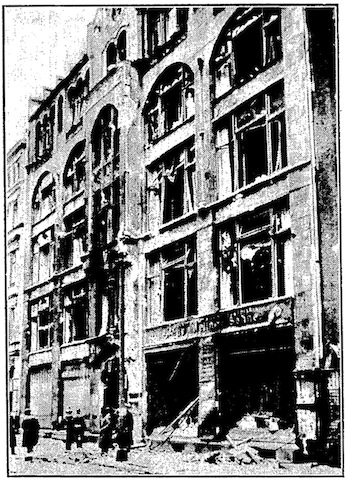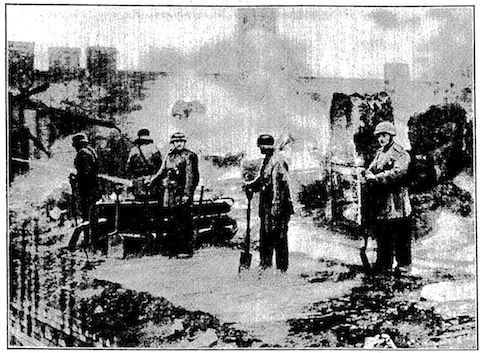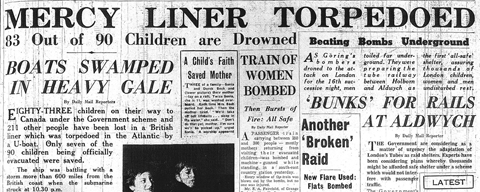Monday 23 September 1940
 |
| Damage caused by the RAF raid on Berlin. This photo receives very wide press exposure on both sides of the Atlantic. |
Things get rolling around first daylight when the Ark Royal launches aircraft manned by Free French. In an overly optimistic miscalculation, they land at Dakar airport to be greeted as liberators but are immediately taken prisoner. In addition, a launch representing the Free French enters the port expecting to be greeted warmly, but turns back when fired upon.
The Vichy French lose two submarines. British destroyer HMS Fortune detects a Vichy French submarine, the Ajax (Q148), which it forces to surface and then sinks. All 61 on board survive. HMS Dragon, Foresight and Inglefield spot French submarine Persée (Q154) attempting to attack cruiser HMS Dragon and shell it, sinking it. Some reports state that torpedo planes sank the submarines, and with all the Royal Navy ships in the vicinity it well may have been a joint effort.
Around 10:00, Vichy French ships in the port sally. Cruiser HMAS Australia fires upon them and forces them back. This leads shore batteries to open fire on the Australia, which, along with the rest of the Royal Navy ships, returns fire. The Australia hits the Vichy French destroyer L'Audacieux, which turns it into a flaming inferno that has to be beached. There are 81 deaths and 186 survivors.
Royal Navy battleships Barham and Resolution exchange fire with anchored French battleship Richelieu and damage it, though it remains able to fire its main guns. HMS Dragon is damaged by shell splinters, wounding a crewman, while HMS Cumberland is hit in the engine room and retreats to Bathurst for repairs. Vichy French freighters Porthos Korsholm and Tamara are damaged.
The Royal Navy then moves further offshore after also damaging freighter Tacoma in the harbor, causing six crew deaths. The Tacoma has to be beached.
The British make the next move. They send three sloops full of Free French soldiers to Rufisque, southeast of Dakar. The Vichy French open fire, completely defeating the landing attempt (a very rare event during World War II) and damaging the Commandant Duboc. General de Gaulle, who is present, gives the order to retreat personally as he does not want to "shed the blood of Frenchmen for Frenchmen."
During the afternoon, the Royal Navy ships approach the port again. This time, the French coastal batteries score some hits on the Barham. The Vichy French then launch an air raid on Gibraltar with 64 bombers based in Morocco and Algeria which causes minor damage.
As the day ends, little has changed, with the British standing offshore and the Vichy French holding tight to the port. That, in essence, is a victory for the Vichy French, but the British continue to lurk.
 |
| Another widely distributed photo showing Berlin bomb damage. |
European Air Operations: The RAF targets Berlin in the early morning hours with 129 bombers. The raid causes minor damages that receives extensive worldwide publicity. A subsequent press release from the British Air Ministry describes it:
Throughout last night [Monday] strong bomber forces of the R.A.F. delivered a heavy attack on military objectives in and around Berlin. This attack was on a much larger scale than any yet carried out, and preliminary reports show that extensive damage was done.
Among the targets selected by our aircraft and heavily bombed were Rangsdorf railway station and several goods yards, including that at Grünewald; the west tower of Wilmersdorf electric power station; gasworks at Dantzigerstrasse and Neukölln; factories at Charlottenburg and Spandau, including Brandenburg motor works, and other objectives.Lesser raids also take place on the Kiel Canal, an aircraft factory at Wismar, the Hamburg ports, and the usual northwestern airfields and Channel ports.
Battle of Britain: The weather finally turns clear and bright today after an extended period of clouds and occasional rain over much of Great Britain. The Luftwaffe sends over a large raid of fighters unusually early, about 09:00, with the 200+ planes breaking in all directions once they cross the coast. RAF Fighter Command responds with 14 Squadrons but is late off the ball, miscalculating the raiders' rate of approach due to the fact that they are fighters and not bomber formations.
Fierce dogfights break out all across the Kent countryside. Both sides take losses about equally, with the RAF losing eleven fighters.
Hans-Joachim Marseille has to bail out over the Channel after his plane takes damage about 10 miles off Cap Gris Nez. He is shaken up and spends hours in the water. Fortunately, a Heinkel He 59 spots him and returns him to a field hospital. As usual, there is disputed credit for his shoot-down, but the best case seems to lie with Robert Stanford Tuck. Marseille, developing into a very talented pilot, also is developing a reputation as an uncontrollable pilot who does not follow orders, in other words, a bit of a prima donna.
The early afternoon is fairly quiet, with a dogfight over Dover that is fairly uneventful. Another large formation approaches around 17:30 and spreads out all across southern England. The RAF again intervenes, but there are no reported losses.
After nightfall, the Luftwaffe sends 261 bombers against London and various points in the southwest. There are additional waves of attack thereafter. London is attacked all night long until shortly before sunrise. Particularly hard hit are the Clarnico factory, West Ham (numerous fires), Stevenage Wharf, Bexhill, Hastings, and Seaford.
Overall, the Luftwaffe takes about 15-20 losses and the RAF about a dozen. It is a higher loss rate than in recent days, but much less than the hardest days of August and early September.
Werner Mölders was awarded the 2nd Knight's Cross of the Iron Cross with Oak Leaves (Ritterkreuz des Eisernen Kreuzes mit Eichenlaub) on 21 September 1940 for becoming the first pilot to get credit for 40 victories. Adolf Hitler personally pins it on him today in the new Reichskanzlei in Berlin. Afterward, his boss Hermann Göring invites Mölders to his hunting lodge in the Rominter Heide.
Hptm. Wilhelm Balthasar from Stab III./JG 3 is credited with downing two Spitfires.
Oblt. Hans "Assi" Hahn of 4,/JG 2 receives the Ritterkreuz for his 20th victory.
 |
| The paint scheme on Adolf Galland's Bf 109E fighter as of 23 September 1940. Source: Robert Michalec, "Messerschmitt Me 109," AJ-Press. |
German minesweeper M-1604 hits a mine and sinks.
British freighters Empire Adventure and Empire Airman, torpedoed on 21 and 22 September, respectively, sink while in tow.
The Luftwaffe damages British freighters Pacific Grove and Corinia at Channel ports.
British submarine HMS Cachalot lays minefield FD 27.
A small destroyer flotilla departs from the Lizard on Operation G, a patrol of the French coast.
Convoy FN 289 departs from Southend, Convoy BN 6 departs from Bombay.
US coastal defense submarine USS R-1 is recommissioned.
Battle of the Mediterranean: The RAF attacks the Italian fortress of Tobruk and the airfield at El-Menastir, Libya. Royal Navy gunboat HMS Ladybird bombards Sidi Barrani.
Prime Minister Churchill has worries about Malta. He agrees with a note from Malta Governor Dobbie that there are insufficient ground troops there. In a note to the Chief of the Imperial General Staff, he notes:
The telegram (from Malta Cmd) confirms my apprehensions about Malta. Beaches defended on an average front of 15 miles, and no reserves for counter-attack worth speaking of, leave the Island at the mercy of a landing force. You must remember that we do not possess the command of the sea around Malta. The danger therefore appears to be extreme. I should have thought four battalions were needed....He also sends another note to the Secretary of State for War warning that Malta could be attacked "at any time."
On Malta itself, three Wellingtons arrive at Lupa Airfield during the morning, but one crashes upon landing and is out of action for the foreseeable future. Two Sunderland Short flying boats arrive at Kalafrana with some workers for the dockyards.
Anglo/US Relations: Seven more US destroyers arrive at Halifax to be turned over to the Royal Navy as part of the destroyers-for-bases deal. The US Greenslade Board, investigating the newly acquired British bases, is now en route to Norfolk, Virginia.
French Indochina: With Japanese troops pouring across the border, a Vichy French garrison at Da Nang, a coastal city about midway down the shoreline, defends the city. The Japanese quickly take control of Tonkin Province and today bomb the French airfield at Lang Son. French negotiators in Japan request a cease-fire.
US Secretary of State Cordell Hull attends a press conference today at which he states:
Events are transpiring so rapidly in the Indochina situation that it is impossible to get a clear picture of the minute-to-minute developments. It seems obvious, however, that the status quo is being upset and that this is being achieved under duress. The position of the United States in disapproval and in deprecation of such procedures has repeatedly been stated.
This Government has not at any time or in any way approved the French concessions to Japan. The attitude of this Government toward developments in French Indochina is as expressed by the Secretary of State this morning and in previous public statements.
This foreshadows future events in what will become known as Vietnam in decades to come.
German Government: Hitler meets with local fascist leaders from Holland.
German Military: Lieutenant-Colonel Hans Speidel, Chief of Staff of the military commander in France, submits a detailed report to OKW and Hitler on the course of the aerial campaign against Great Britain. He notes that the battle opened well for the Luftwaffe, but fierce opposition caused the opening of attacks on London to begin too late, and poor weather made them ineffective. The delays enabled the RAF to recover by speeding up pilot training and plane production, with planes rolling straight from the factories into combat. Speidel observes that the new pilots were incompetent and had resorted to ramming Luftwaffe bombers. While crude, the tactics frustrated the Luftwaffe attacks on London and necessitated the third (current) phase of the battle, attacks on London by night and fighter raids by day. He concludes that the RAF Fighter Command is down to 300 fighters, with a production rate of 250 per month and notes:
Our own forces still feel themselves to have the upper hand over the enemy, and are completely confident that the air war can be prosecuted successfully.In essence, Speidel places the blame for the Luftwaffe's failures on fanatical and self-sacrificing RAF pilots and the weather. It is a classic evasion-of-blame report which reveals the continued myopia of the Luftwaffe intelligence section. In point of fact, the RAF still has about 700 fighters in good condition, roughly the same level it has had throughout the battle, and the quality of fighter is increasing as older models get shot down and replaced by newer ones. At this point, everyone knows that the Luftwaffe has not met Hitler's objectives, so Speidel simply paints a happy face on the picture and ends with standard hopes for ultimate success.
 |
| Prototype Jeep, September 1940. The first driver said, "God but it is fun to drive!" They drove 230 miles to the army testing site, making it half an hour before the deadline. |
British Homefront: King George VI addresses the nation. He notes the creation of the George Cross and George Medal, to be given for gallantry "not in the face of the enemy" to members of the British armed forces and to British civilians. These awards typically go to people who perform heroically during the Blitz, such as rescuing people at the peril of their own lives. Many are awarded posthumously. The George Cross is intended as the civilian equivalent of the Victoria Cross, but in practice is awarded to primarily military personnel. The King notes that "our friends in the Americas" will assure final victory.
American Homefront: A Gallup poll illustrates the deep split in US public opinion about the European War. While 52% support helping England win even at the risk of the US getting into the war, 48% feel that it is a higher priority that the US not get into the war.
Charles Coughlin is a well-known opponent of the war known as the "Radio Priest." A Detroit priest who is known as "Father Coughlin," he has had a popular radio show for many years that is widely considered to be anti-Semitic, anti-Roosevelt and anti-war. While his radio audience is immense, reaching up to 30 million per week, he is a very controversial figure not just in the public, but within the Church, where Bishop Michael Gallagher of Detroit allowed him to remain on the air (until his passing in 1937) despite pressure from everyone above.
Today, Coughlin announces in his popular publication Social Justice that he had been forced from the air "by those who control circumstances beyond my reach." This is almost certainly a result of the adoption of new rules which curb the sale of radio time to "spokesmen of controversial public issues" in October 1939, which require that such spokesmen submit copies of their speeches in advance and threaten stations with loss of their licenses.
September 1940
September 1, 1940: RAF's Horrible Weekend
September 2, 1940: German Troopship Sunk
September 3, 1940: Destroyers for Bases
September 4, 1940: Enter Antonescu
September 5, 1940: Stukas Over Malta
September 6, 1940: The Luftwaffe Peaks
September 7, 1940: The Blitz Begins
September 8, 1940: Codeword Cromwell
September 9, 1940: Italians Attack Egypt
September 10, 1940: Hitler Postpones Sealion
September 11, 1940: British Confusion at Gibraltar
September 12, 1940: Warsaw Ghetto Approved
September 13, 1940: Zeros Attack!
September 14, 1940: The Draft Is Back
September 15, 1940: Battle of Britain Day
September 16, 1940: italians Take Sidi Barrani
September 17, 1940: Sealion Kaputt
September 18, 1940: City of Benares Incident
September 19, 1940: Disperse the Barges
September 20, 1940: A Wolfpack Gathers
September 21, 1940: Wolfpack Strikes Convoy HX-72
September 22, 1940: Vietnam War Begins
September 23, 1940: Operation Menace Begins
September 24, 1940: Dakar Fights Back
September 25, 1940: Filton Raid
September 26, 1940: Axis Time
September 27, 1940: Graveney Marsh Battle
September 28, 1940: Radio Belgique Begins
September 29, 1940: Brocklesby Collision
September 30, 1940: Operation Lena
2020


No comments:
Post a Comment